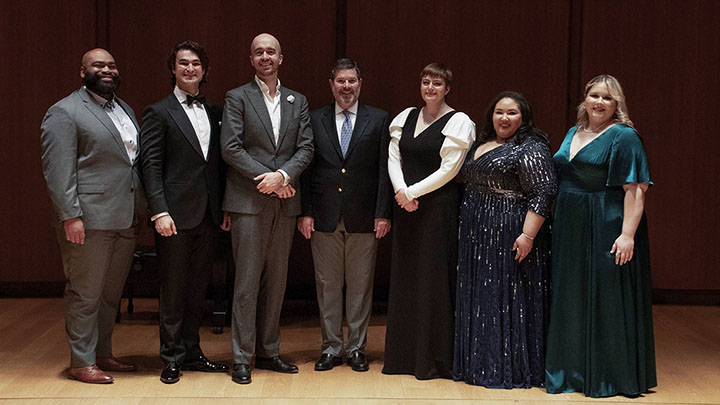Since 1971, The George and Nora London Foundation has been identifying emerging artists, often right before they break through into big-scale stardom. There are many George London winners whose names you might know, including Joyce DiDonato, Renée Fleming, Christine Goerke, Lisette Oropesa, and Will Liverman. Each year, after numerous qualifying rounds, twelve finalists are selected to compete in New York. The Foundation is appropriately generous: simply being one of the twelve guarantees a $2,000 prize (enough to offset flights, food, and clothing, with some left over), but the top six singers are each awarded $12,000, which could pay a young singer’s rent for at least a few months. This is pretty big money. All artists know that the very best way to support us is to pay our bills, and the George and Nora London Foundation offers a valuable reminder that accolades need to come with cash in order to keep singers in the industry. The judges are also fittingly illustrious: Harolyn Blackwell, John H. Hauser, Dimitri Pittas, and Susan Quittmeyercomprised the panel.
On Friday, I watched the finals for this year’s competition and would like to offer, if not a traditional review, a brief roundup of who I found exceptionally watchable and whom I think you, dear parterre boxers, should watch out for in the next few years. This might be your chance to hitch your opera fandom wagon to a rising star or identify a yet-to-be-slighted underdog favorite to fight for in the comments. I’d also like to encourage opera fans to check out such competitions when they allow for audiences—it can be both fun and informative to hear some of one’s favorite arias in this format, as well as to see the range of acting and singing on display. Some singers felt fresh out of graduate school—full of promise but not yet perfectly polished—while others have been making the rounds at all the top festivals, are members of opera studios (lots of Houston Grand Opera studio alums), or have already made their Met debuts.
On the whole, this was an afternoon of very fine singing— these artists are all professionals, after all. What set the top six apart, then, was their dramatic ability and what felt like a discernible identity to their sound and presence.
I sat up a bit straighter in my chair when baritone Benjamin Dickerson launched into “Nemico della patria,” so commanding and lively was his stage presence. This voice is absolutely enormous, too with a hint of grittiness around its edge, matched by natural grandness and ease in his physicality that makes him seem powerful beyond his years.
Darren Drone, baritone, presented an exceptionally polished “Si corre dal notaio” from Gianni Schicchi, rife with physical comedy. Drone was in command of his character at every moment and stood out as eminently stage-ready (in fact, you may catch him later this spring, as he will appear in the Met’s revival of Fire Shut Up in My Bones). His performance was that rarest of things: a comic aria that actually got laughs in a concert setting.
Mezzo Erin Wagner’s rendition of the Composer’s aria from Ariadne auf Naxos was in my top two for the entire evening. Her staggering control, even amidst her character’s overwrought emotional trajectory, led to a thrilling performance with a distinct edge. She produces a fountain of decadent, indefatigable sound, well worth dipping one’s toes into.
Samuel White, who took on “Amfortas! Die Wunde,” had both power and sweetness to his tone, both of which promise very well indeed for the tenor. Of the winners, White’s voice felt the most in-process—as the aria progressed, he took on increasing warmth and richness, revealing a nuanced and sparkling tenor sound. His development will be especially worth tracking.
Katerina Burton, however, offered the finest singing of the afternoon, however, in her exquisite rendition of “Tu che la vanità,” from Don Carlo. Burton is a subtle actress—she didn’t need to move much or do much at all. She just let her voice tell Verdi’s story, offering her audience a varied palette of vocal colors: from plush lyricism to glimmering pianissimo to rich, throaty chest register. To paraphrase something once said to me by my own voice teacher, the very same Harolyn Blackwell: great singers act, but the best singers can just stand there and pull you in.
The competition rocketed to life with mezzo Emily Treigle’s (yes, related to Norman Treigle: he’s her grandfather) “Iris, hence away.” Stalking around the stage in a forest green gown, her eyes (and coloratura) blazing, Ms. Treigle had “scary goddess” down to a science. She’s endlessly watchable and a consummate musician.
Honorable mention should also go to bass-baritone Ben Strong, who closed the competition the devilishly difficult cavatina for the title character from Rachmaninoff’s Aleko. Strong has a full and balanced sound with consistent color and identity. This aria suited him wonderfully, giving him plenty of vocal territory to traverse. I’d keep an eye on him, along with mezzo Cierra Byrd, who’s powerful and emotive “O ma lyre immortelle” (admittedly a beloved aria of mine) was an early favorite.
Fortunately for readers, a video recording of competition was also available through the Foundation.
Photo: Beth Bergman




